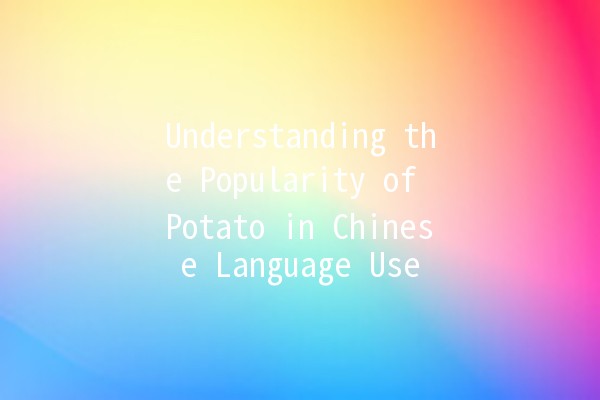The word "potato" has transcended its humble beginnings as a staple food to become a prominent part of various languages and cultures across the globe, including Chinese. In this article, we will explore the significance of "potato" within the Chinese language context, focusing specifically on the usage statistics, cultural implications, and the growing popularity of the term among Chinese speakers.
The Landscape of Chinese Language and "Potato"
Global Context
Chinese is one of the most spoken languages worldwide, with over 1 billion native speakers. As globalization continues to influence communication patterns, terms related to food, technology, and cultural references have adapted to reflect modern language use, including the word "potato."
The Chinese Term for Potato

In Chinese, "potato" is called "土豆" (tǔ dòu), which literally translates to "earth bean." The name reflects the potato's agricultural roots and its popularity as a food source in both traditional and modern Chinese cuisine.
Current Usage Statistics
Popularity Metrics
While exact statistics regarding the number of times "potato" is spoken or written in Chinese are challenging to gather, various indicators can shed light on its popularity:
Top 5 ProductivityBoosting Tips for Language Learners Using "Potato" in Conversation
Incorporating the term "potato" into everyday conversation can be a fun and engaging way for Chinese language learners to practice. Here are five tips to enhance your productivity in using "土豆":
Explanation: Compile lists of words related to the potato, such as various dishes (e.g., mashed potatoes, fries) or culinary techniques (boiling, baking).
Example: Make flashcards with images and pinyin to memorize terms like “炸土豆条” (zhà tǔdòu tiáo) for "fried potato strips."
Explanation: Use language exchange applications to practice conversational skills with native speakers, focusing on food topics.
Example: Initiate discussions like “你喜欢怎样吃土豆?” (Nǐ xǐhuān zěnyàng chī tǔdòu?) which translates to "How do you like to eat potatoes?"
Explanation: Engage with content created by food bloggers who explore potato dishes. This not only boosts vocabulary but provides insights into cultural nuances.
Example: Follow popular Chinese food channels on platforms like Bilibili that focus on potato recipes while practicing listening skills.
Explanation: Join a cooking class that teaches traditional Chinese dishes focused on potatoes. This handson experience reinforces language learning in context.
Example: Learn how to make "土豆丝" (tǔdòu sī), a traditional shredded potato dish, while practicing vocabulary related to cooking.
Explanation: Encourage yourself to write short stories or dialogues incorporating "土豆." This reinforces grammar and word usage.
Example: Write a short narrative about a family dinner featuring various potato dishes, practicing different verb forms and sentence structures.
Interesting s on Cultural Significance
Potatoes in Chinese Cuisine
In Chinese culture, potatoes are versatile ingredients. They can be found in traditional dishes such as "土豆炖牛肉" (tǔdòu dùn niúròu), which is braised beef with potatoes. This highlights the cultural integration of the potato into Chinese culinary practices.
The Rise of Memes and Humor
The term "土豆" has also found its way into internet slang and memes, often used humorously to describe clumsiness or inferiority. For example, calling someone a "土豆人" (tǔdòu rén) can imply they are awkward, leading to playful language use among younger generations.
Global Influence on Language
With the increasing exposure to Western cultures, especially through media and entertainment, words associated with popular culture, such as "potato" in memes related to humor, beauty trends, or food challenges, have gained traction among Chinese speakers.
Common Questions About "Potato" in Chinese Language Use
Potatoes have become a staple ingredient in Chinese cooking, symbolizing adaptability and versatility. They are featured in various traditional dishes, showcasing regional flavors and cooking techniques that enhance their appeal.
While "土豆" may not have widely recognized idioms, its usage in modern humor and memes reflects the playful evolution of language among younger speakers.
Globalization has led to the adoption of diverse culinary influences, incorporating potatoes into traditional recipes and encouraging innovative dishes that reflect contemporary tastes.
Popular dishes include "土豆丝" (shredded potatoes), "土豆炖牛肉" (braised beef with potatoes), and the increasingly popular French fries available in fastfood restaurants across the country.
Engaging with content like cooking shows, blogs, and informal conversations allows learners to build a strong vocabulary base about food, illustrating usage in context for better retention.
"土豆" is commonly referenced when discussing meals, recipes, or when ordering food at restaurants, making it a practical term for language learners to master.
By engaging with the term "potato" in various contexts, learners can enhance their Chinese language skills while appreciating the cultural significance it holds in both traditional and modern settings. As language continues to evolve, so does the usage of terms like "土豆," reflecting the dynamic relationship between culture, food, and communication.